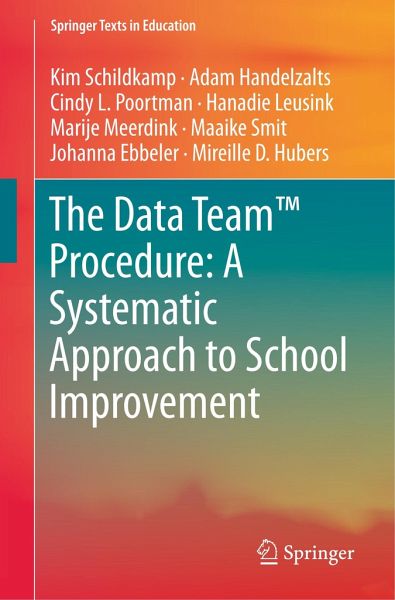
The Data Team(TM) Procedure: A Systematic Approach to School Improvement

PAYBACK Punkte
25 °P sammeln!
This book describes the Data Team Procedure: a method for data-based decision making that can help schools to improve their quality. It involves the use of teams consisting of 4-6 teachers, 1-2 school leaders and a data expert. The members of the team collaboratively learn how to use data to solve an educational problem within the school, adopting a systematic approach. The data team procedure is an iterative and cyclic procedure consisting of eight steps. The data team members are trained in the data team procedure by a coach. The coach visits the data team's school regularly for a meeting an...
This book describes the Data Team Procedure: a method for data-based decision making that can help schools to improve their quality. It involves the use of teams consisting of 4-6 teachers, 1-2 school leaders and a data expert. The members of the team collaboratively learn how to use data to solve an educational problem within the school, adopting a systematic approach. The data team procedure is an iterative and cyclic procedure consisting of eight steps. The data team members are trained in the data team procedure by a coach. The coach visits the data team's school regularly for a meeting and facilitates working according to the systematic procedure. Teams participate in data analysis workshops for more specific support.
Divided into three parts, the book first describes the importance of data use and the data team procedure. Next, it describes two cases. The first case concerns a data team working on a school level problem: Reducing grade repetition. The second case concerns a data team working on a classroom level problem: low student achievement in English language. The last part of the book explains what it means to implement the data team procedure in the school, the conditions needed for implementing the data team procedure, and the factors that may hinder or support the use of data in data teams.
Divided into three parts, the book first describes the importance of data use and the data team procedure. Next, it describes two cases. The first case concerns a data team working on a school level problem: Reducing grade repetition. The second case concerns a data team working on a classroom level problem: low student achievement in English language. The last part of the book explains what it means to implement the data team procedure in the school, the conditions needed for implementing the data team procedure, and the factors that may hinder or support the use of data in data teams.












